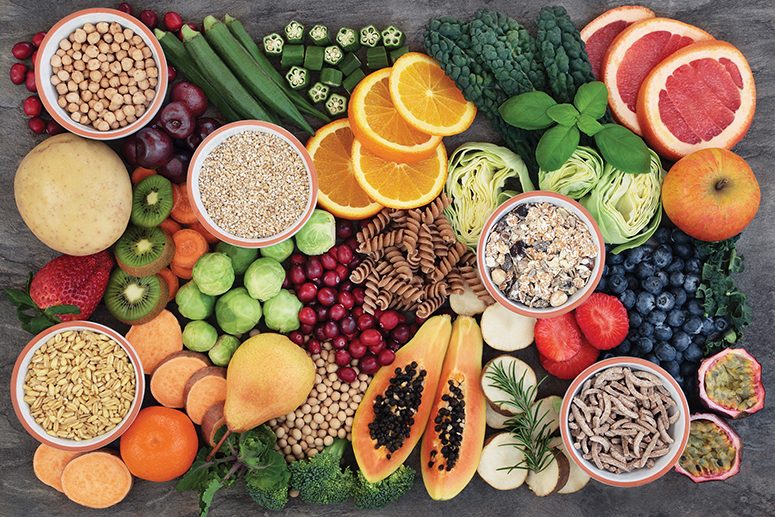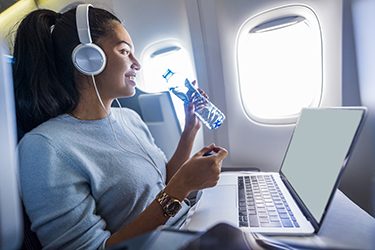Gastrointestinal Issues:
Constipation, HEARTBURN/REFLEX (GERD),
HEMORRHOIDS, GOUT

Constipation
Usually a chronic condition that arises from a gradual change in bowel habits, constipation is characterized by small, hard stools, increased straining to pass stool and decreased frequency of bowel movements. This condition may lead to pain and the sensation of needing to defecate but being unable to pass stool. Some diseases such as multiple sclerosis, diabetes and Parkinson’s disease increase the risk for constipation. Medications that may cause constipation include iron-containing supplements, antacids, antihistamines (used for allergies and motion sickness), antidepressants, blood pressure medications and narcotic pain relievers. Consuming alcohol and caffeine may promote dehydration,
which contributes to constipation.
Even people with regular bowel movements may experience constipation while traveling because of changes in daily routines, different foods, internal body clock disruptions due to jet lag, dehydration, travel-related stress, limited bathroom access and aversion to using public bathrooms.
Similarly, boating conditions may contribute to constipation due to
diet changes, a more sedentary lifestyle, insufficient hydration, inconvenience of passing stool in close quarters or side effects of
motion sickness medications.
Symptoms: Common symptoms are lower abdominal cramping on the left side and rectal pressure. Pain often varies throughout the day and is relieved with bowel movements. People often feel bloated and soemtimes nauseated. An exam of the rectum may reveal a hard lump of stool. Palpation of the abdomen may mildly increase pain, but severe pain with palpation should not be present. Bleeding should not occur when having a bowel movement but may arise from constipation complications such as rectal fissures. Blood in the stool (not around the stool or on the toilet paper) should prompt further evaluation by a physician if accompanied by other blood loss symptoms or severe abdominal pain.
Treatment: When constipation is suspected, increase water consumption and consume 20–35 grams of dietary fiber per day. Good sources of fiber include fruits (prunes), vegetables, nuts and whole wheat bread. If these foods are not helpful, laxatives are an option. Some laxatives such as Metamucil, Citrucel, FiberCon and Benefiber work similarly to fiber in your diet. Others such as MiraLax, GlycoLax, magnesium citrate and magnesium hydroxide work by drawing more water into your stool. Laxatives such as senna and bisacodyl work by stimulating your bowels to move. Other medications delivered by enema (through a tube inserted into the rectum) may also help treat constipation.
Prevention: Avoid medications that may cause constipation, and participate in regular activity and exercise. Stay hydrated by drinking at least eight 8-ounce glasses of water a day, and include fiber-rich foods in your diet. Moving your bowels when you feel the urge can also help prevent constipation.
Impact on boating: Pain associated with constipation may limit daily activities but should resolve with a return to regular bowel habits. Taking over-the-counter medications and supplementing your diet should help with symptoms. See a physician if constipation leads to bloating and severe, unremitting abdominal pain with associated nausea and vomiting.
Considerations for divers: Prolonged constipation usually diminishes the desire to engage in physical activities. If divers with constipation feel up for diving, however, they should consider their discomfort and whether they feel any bloating. Abdominal organs and their fatty mantels may produce a lot of bubbles after decompression, which may impair circulation and lymph drainage.
Heartburn/Reflex (GERD)
Despite its name, heartburn has nothing to do with the heart; it is a symptom of gastroesophageal reflux disease (GERD). GERD is caused by leakage of acidic fluids from the stomach into the lower portion of the esophagus, which causes a burning sensation in the center of the chest and esophagus. The esophagus cannot tolerate the acid as well as the stomach can, resulting in inflammation and pain. Heartburn is often worse following large meals, after eating certain foods or when bending forward, straining or lying flat (especially after meals or in the morning). Reflux is common, especially in pregnant women, obese people, people who eat spicy foods or eat late at night and people who drink lots of alcohol.
Symptoms: The most common GERD symptom is a burning sensation in the center of the chest that typically moves up the esophagus toward the back of the throat. It is often associated with belching, nausea, a chronic dry cough, a sour or bitter taste in the back of the mouth, discomfort when swallowing and occasionally hoarseness. The abdominal pain is usually worse after meals and is associated with a sensation of fullness or bloating, but this is not true for everyone. Over time, this leaking of acidic fluids into the esophagus can lead to permanent damage. GERD is diagnosed primarily based on history, except in extreme circumstances in which a procedure called endoscopy is performed in a doctor’s office.
Treatment: The best treatment for GERD is avoidance of foods and habits that can worsen reflux. Once symptoms start, the treatments are primarily associated with lifestyle. They include the following: (1) elevating the head of the bed at least 6 inches to allow gravity to assist in preventing leakage of acidic stomach contents upward, (2) eating smaller meals at least three to four hours before lying down or going to sleep, (3) avoiding late-night snacks and alcohol before bedtime, (4) limiting foods that may worsen reflux, (5) refraining from smoking, (6) wearing loose-fitting clothing to reduce abdominal pressure (which may increase reflux) and (7) maintaining a healthy weight.
Medications that may help reduce acid reflux include over-the-counter antacids, but some antacids may cause side effects such as constipation, diarrhea and decreased absorption of other medications, so chronic use is not recommended. Other antacids include H2 blockers and proton pump inhibitors. These are effective medications, but they work gradually and may not be best for people who want immediate relief of acute symptoms. Emergency treatment is warranted only when reflux is associated with severe, unremitting abdominal pain or bloody vomiting.
Prevention: The best way to avoid GERD is to avoid foods that lead to increased acid production in the stomach. To avoid worsening your reflux, limit consumption of foods such as citrus fruits, chocolate, caffeine, spicy foods, fatty foods, fried foods, garlic, onions, peppermints and tomatoes. The lifestyle modifications listed in the treatment section may also be helpful.
Considerations for divers: Diving may provoke reflux, which could be dangerous while underwater.
Hemorrhoids
Hemorrhoids are swollen blood vessels in the rectum and may present in several ways, but they are often associated with itching, burning, pain or swelling. Symptoms can occur during defecation or while at rest. Hemorrhoids can be either internal or external. Internal hemorrhoids are inside the rectum and cannot be seen in an external exam, while external hemorrhoids can be seen and felt on external examination. Hemorrhoids are common in pregnant women, people who deal with chronic constipation, the elderly and people with diarrhea. Straining during bowel movements or sitting for too long on a toilet can worsen existing hemorrhoids.
Symptoms: Hemorrhoids are often associated with itching around the anus, rectal pain, swelling of the tissue around the anus and painless rectal bleeding. Examination of the rectum will reveal a swollen, flesh-colored or purplish lump (in cases of external hemorrhoids). Bleeding associated with hemorrhoids usually involves only a small amount of bright red blood that is seen in the toilet or on toilet paper after wiping, but any person with rectal bleeding should see a physician to determine the definite cause. Intermittent bright-red blood from the rectum and blood surrounding stools (not bloody stools) can typically be managed at a later date, but significant blood loss — causing lightheadedness, generalized weakness, fatigue, headaches or passing out for no other apparent reason — warrants immediate medical attention.
Treatment: Hemorrhoids are often easily treatable at home. If they are caused by problems such as constipation, treat the underlying cause with stool softeners or laxatives as well as a diet rich in fiber, whole grains and plenty of water. Relieve pain from hemorrhoids with pramoxine ointment, hydrocortisone rectal cream or benzocaine ointment. Soaking the area in warm water can also help with pain and irritation. Hemorrhoids that are extremely painful or not responding to normal treatment may need treatment by a physician.
Prevention: The best way to prevent hemorrhoids is to avoid constipation and straining when having a bowel movement. Eat plenty of fruit and vegetables, take fiber supplements, or use stool softeners if needed.
Impact on boating: Hemorrhoids may become painful, but they are not life-threatening. Pain is often worse after bowel movements but topical medications, rest and avoiding further constipation and/or straining with bowel movements can provide relief.
Gout
An intensely painful and disabling inflammatory arthritis, gout usually affects a single joint at a time, but more than one joint can be affected simultaneously. It most commonly affects the big toe but can also involve the knees, elbows and other joints. An acute attack of gout usually resolves after a few days to weeks, but it can sometimes be chronic with recurring episodes.
Gout develops in people with chronically elevated blood uric acid levels and affects up to 4 percent of adults in the U.S. Men with gout usually develop it between ages 30 and 45, while women usually experience it after age 55. Risk factors include obesity, hypertension, kidney disease, excessive alcohol intake and consumption of significant amounts of meat, seafood and high fructose corn syrup. Travel can also contribute to a flare-up of gout due to changes in diet, dehydration or lack of physical activity.
Symptoms: Often occurring overnight, gout attacks are characterized by the sudden onset of severe joint pain with redness, swelling and tenderness of the joint. Pain usually restricts movement, and people experiencing a flare-up may keep their foot out of the bedsheets as even the pressure from the linens can illicit pain. They may still be able to walk but often with a lot of pain. Pain reaches peak intensity within 12 to 24 hours and usually resolves after a few days to a week.
Many illnesses, including infection, rheumatoid arthritis, pseudogout and inflammatory conditions, can cause joint pain and inflammation. A physician can tentatively diagnose gout based on a physical examination and the person’s symptoms, but a definitive diagnosis comes after finding elevated uric acid in the joint fluid.
Treatment: For acute attacks, the goal is to quickly and safely reduce pain, inflammation and disability. Medications usually depend on a person’s kidney function, risk of bleeding and response to previous treatments. Nonsteroidal anti-inflammatory drugs (NSAIDs) are usually the first line treatment for people with no history of stomach ulcers or kidney disease. Start these medications as soon as possible after an attack, and continue taking them for a day or two after resolution. For people who are unable to take NSAIDs, a physician may prescribe corticosteroids such as prednisone.
Prevention: Medications that decrease uric acid levels may help prevent gout attacks from occurring, and dietary changes and weight loss may lessen their frequency. People with gout should eat low-fat dairy, whole grains, brown rice, oats, vitamin C, cherries and moderate amounts of coffee. They should avoid beer, liquor, organ meats and foods containing high fructose corn syrup and limit serving sizes of beef, lamb, pork and seafood such as sardines, shellfish and mackerel.
Impact on boating: The majority of people who suffer from gout or acute gout attacks can safely go boating, but they should make sure they have their appropriate medications on board for any prolonged excursions. NSAIDs may not be available over the counter in some parts of the world, so be sure to bring an adequate supply of them and any prescription medications on any boat trip.
If an acute gout attack occurs during travel, be especially careful when walking on a boat deck since the pain can severely limit one’s ability to move about safely. If a first-time attack is suspected, seek medical attention for a definitive diagnosis. Seek emergency medical care if pain becomes intolerable, the diagnosis is not definitive or a joint infection is possible.

Even people with regular bowel movements may experience constipation while traveling because of changes in daily routines, different foods, internal body clock disruptions due to jet lag, dehydration, travel-related stress, limited bathroom access and aversion to using public bathrooms.

Stay hydrated by drinking at least eight 8-ounce glasses of water a day, and include fiber-rich foods in your diet.

The most common GERD symptom is a burning sensation in the center of the chest that typically moves up the esophagus toward the back of the throat.

The best way to avoid GERD is to avoid foods that lead to increased acid production in the stomach.

Relieve pain from hemorrhoids with pramoxine ointment, hydrocortisone rectal cream or benzocaine ointment. Soaking the area in warm water can also help with pain and irritation.

Gout most commonly affects the big toe but can also involve the knees, elbows and other joints. problem arises.

If an acute gout attack occurs during travel, be especially careful when walking on a boat deck since the pain can severely limit one’s ability to move about safely.
DAN Customer Service
Mon–Fri, 8:30 a.m. – 5 p.m. ET
+1 (919) 684-2948
+1 (800) 446-2671
Fax: +1 (919) 490-6630
24/7 Emergency Hotline
In event of a dive accident or injury, call local EMS first, then call DAN.
24/7 Emergency Hotline:
+1 (919) 684-9111
(Collect calls accepted)
DAN must arrange transportation for covered emergency medical evacuation fees to be paid.
Medical Information Line
Get answers to your nonemergency health and diving questions.
Mon–Fri, 8:30 a.m. – 5 p.m. ET
+1 (919) 684-2948, Option 4
Online: Ask A Medic
(Allow 24-48 hours for a response.)